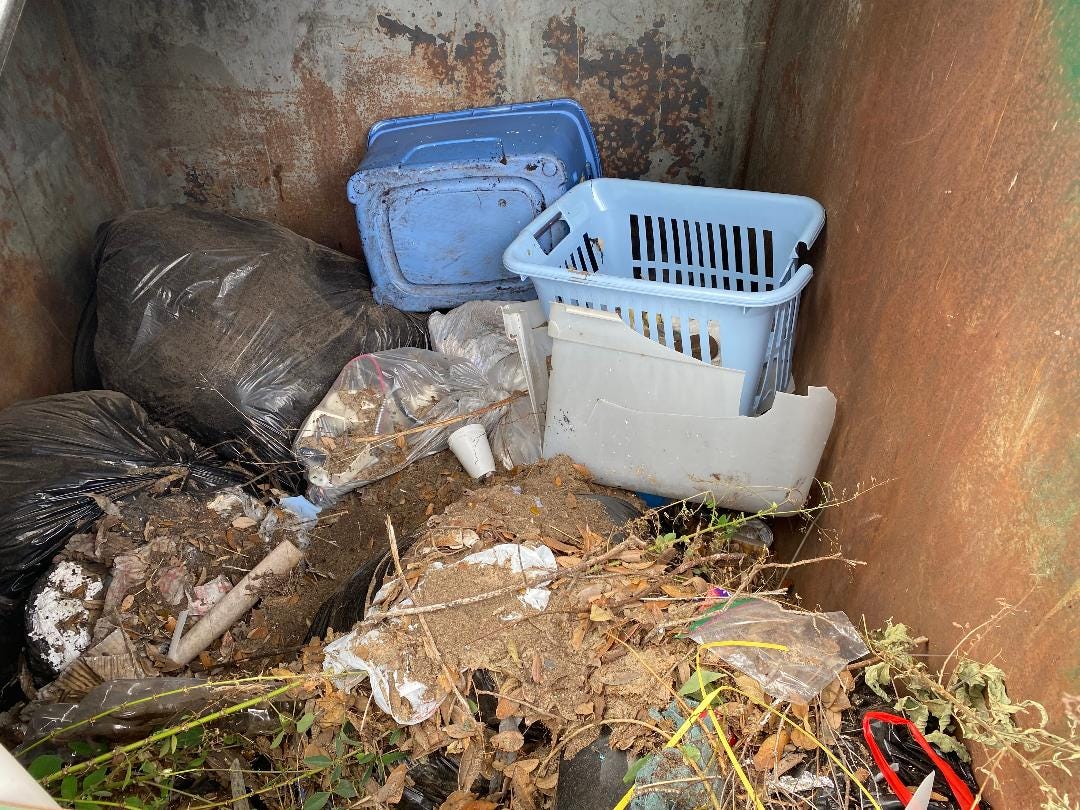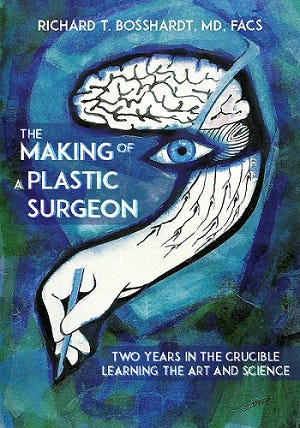Musings on Medicine, Ownership, and a Dumpster
Without a sense of ownership by physicians, medicine will suffer and so will patients
Our multi-practice, multi-specialty medical building has a large dumpster in the parking lot located inside a concrete bunker behind large metal swinging doors. It is painted to match the building in order to blend in. I recently had to take out some trash. When I opened the doors I was assailed with a stench of rottenness and the ground surrounding the dumpster was covered in several inches of dirt, trash, leaves, plastics of various sorts, and there was a 50 quart plastic bin filled with green water that was probably the source of a large proportion of the local mosquito population. This had obviously been there for a long time. It was disgusting.
Since all the offices use the dumpster, the condition around the dumpster must have been known to all who threw trash in there. These would be employees. I doubted a single physician in the building knew the conditions around the dumpster. So, who was responsible for cleaning it up? The dumpster belongs to the city, but the bunker belongs to our Condominium Association and is shared by all. I am the President (seemingly for life) of our Condo Association. We have a building superintendent, but he does not do maintenance work personally. Who was supposed to clean this up? My solution was simple.
One Saturday, I came to the office, opened the bunker doors, swept up all the trash, and deposited it in the dumpster. I emptied the bin of water and threw that in too. It took me all of thirty minutes, but the satisfaction of that little bit of clean up was profound.
Why did I do this rather than delegate it? One reason is my sense of ownership for my practice and the building I practice in, including that bunker and dumpster, the City of Tavares and our Condo Association notwithstanding. I could delegate or do it. I decided on the latter. I have made similar decisions in the past.
When I began my residency in plastic surgery nearly four decades ago, the Division of Plastic Surgery office was located in one of the oldest buildings on the medical campus. It was now largely empty except for us. The tiny, cramped space, more like a closet than an office, had not been painted in decades. Pain was peeling all over the walls. I could not imagine what a patient would think entering that office for their consultation. One night, when I was on call for the emergency room, I brought with me a scraper, some brushes, and a can of paint. I scraped the walls and painted the entire office. The next day, everyone in the Division- my co-residents and the attending physicians expressed surprise and amazement that I did this. Why did I do it? As a resident, I felt a sense of ownership in the program and wanted the best for our patients, even to the surroundings in which we saw them. It was as simple as that.
I think we physicians have largely lost that sense of ownership of our profession. For too long we have had our heads in the sand. It was too easy for us to think that we could just lose ourselves in taking care of patients and the rest of medical practice administration, regulation, and management would take care of itself. We have accepted a corporate model for medical practice in which we have little to no agency. We allowed ourselves to be lumped together with other medical workers whose education and training are a small fraction of our own under the banner of “provider”. We have been subjected to onerous, inexplicable, incoherent bureaucratic demands and regulations that have nothing to do with the quality of medical care. We now judge doctors based on patient satisfaction surveys, e.g. Press-Ganey scores, as though these are a measure of competence and good patient care. How we practice is dictated by administrators, accountants, attorneys, and politicians who have no clue what medical practice is about or understand the oath we took when we became physicians.
More than 80% of all physicians are now employed rather than in independent practice. I fear for a generation of young physicians who will never know that sense of ownership. They will train and practice in an environment where they are just another equal member of the “team”. Yes, medicine is a team effort. I could not function without my nurses and front office staff, but I am the head of that team. I establish and maintain the mission and character of the practice. The buck stops with me.
If I see a piece of paper or paper chad from a hole punch on the floor in my office, I pick it up. If I go into the staff lounge and there is a sink with dirty dishes, I wash them. I don’t ask someone to do this. I have been known to pull out a vacuum cleaner, touch up paint on a wall that was dinged, and even straighten picture frames. I do this because I am an owner and taking ownership means paying attention to the little things.
Medicine is broken. How? Let me count the ways. Medical education and training now place a premium on diversity, equity, and inclusion at the expense of meritocracy and excellence. Immutable characteristics trump performance. Precious hours of medical education are being squandered to produce social justice warriors who are more concerned about historic wrongs than about the patient in front of them. Standards are being lowered and I am convinced that the quality of care is being steadily eroded. Physicians have accepted top-down mandates from the government on how they should care for patients. This became glaringly obvious during the Covid pandemic. Some physicians are actually debating the reality of binary sex and gender, and affirming the confusion of children and the delusions of so-called professionals that medicine is capable of turning a biological male into a female and vice versa, and that this is a good thing absent any reliable, reproducible data supporting this. Medical organizations are silencing and canceling physicians who disagree with their favored ideological positions or oppose the racialization of medicine.
It will be up to us older, wiser, and more experienced physicians to stand up for Hippocratic medicine and restore medicine to what it should be: a sacred relationship between a physician and the patient, first and foremost. We need to return to a striving for excellence above all else. For this to happen, physicians will have to re-take ownership of their practices. If we do not, I feel medicine is lost.
Richard T. Bosshardt, MD, FACS, Senior Fellow at Do No Harm, Founding Fellow at FAIR in Medicine.
My book, The Making of a Plastic Surgeon: Two Years in the Crucible Learning the Art and Science will take you behind the scenes to learn what it takes to become a plastic surgeon. It is available now at Amazon in eBook and paperback.







You are absolutely right. Training has fallen off, and physicians have surrendered control of their practice of medicine, to the detriment of the phtsucalbsrare of tge patients abd the mental state of the doctors. When I recently had cataract surgery, the first question asked by admitting was whether I wanted to be called he or she!
I have asked people with whom I have regular contact, and not ONE new internist has examined their eyes with an ophthalmoscope, asked them to stick their tongue out and say aah, and of course never looked into their ears. The nurse determines their weight by asking them how much they weigh. And I don't dare ask if any doctor ever squeezed their neck from behind with their fingers in front and asked them to swallow to feel for nodules as their thyroid gland moves up and down. No one's heart is listened to in the three basic positions: sitting up, lying down, and in the left.lateral decubitus position. And doctors have defended listening to the heart and lungs through a blouse or shirt, which is the way the listening is always depicted in all.hospital system ads. God help the patients, and they don't even know that they are being underexamimed.
Worth repeating what medicine should be: "a sacred relationship between a physician and the patient, first and foremost."